College Sports
2-time Olympian Jordan Chiles shows up courtside for Valkyries-Sparks OT thriller
The post 2-time Olympian Jordan Chiles shows up courtside for Valkyries-Sparks OT thriller appeared first on ClutchPoints. The energy at Crypto.com Arena was already electric on Monday night, but the crowd buzzed louder when two-time Olympic gold medalist Jordan Chiles took her seat courtside. The WNBA delivered one of its most thrilling games of the […]
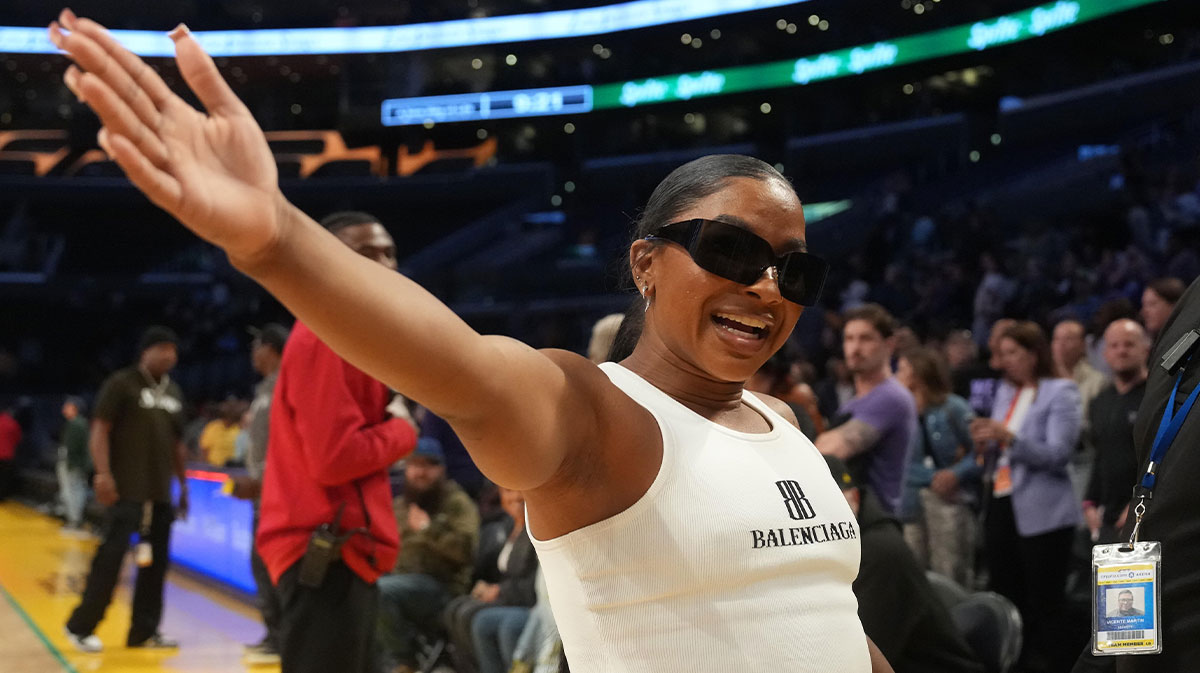
The post 2-time Olympian Jordan Chiles shows up courtside for Valkyries-Sparks OT thriller appeared first on ClutchPoints.
The energy at Crypto.com Arena was already electric on Monday night, but the crowd buzzed louder when two-time Olympic gold medalist Jordan Chiles took her seat courtside. The WNBA delivered one of its most thrilling games of the season, and Chiles was there for every moment.
The Golden State Valkyries pulled off a dramatic 89-81 overtime win over the Los Angeles Sparks. Janelle Salaun led the Valkyries with 21 points and 8 rebounds, while Kayla Thornton drilled a clutch three-pointer with 38 seconds left in the extra period. The Sparks had their own firepower with Kelsey Plum dropping 24 points, but it was not enough to hold off Golden State’s late surge.
Advertisement
This game marked a critical point in the season series. The Valkyries now lead 2-1 over the Sparks, continuing their strong form after victories on opening night and today. With both teams battling for playoff positioning, the intensity on the floor was matched by the energy in the stands.
Sitting just a few feet from the court, Jordan Chiles soaked it all in. Known for her electric floor routines and steady presence on the U.S. gymnastics team, Chiles brought her champion spirit into the basketball arena.
She smiled, waved at fans, and stood up during key plays, clearly locked into the action. Her appearance sent a powerful message about the rise of women’s sports and the respect athletes across disciplines have for one another.
Chiles is no stranger to pressure or big stages. She helped Team USA win silver in Tokyo and followed it up with a gold medal performance in Paris in the team competition. Outside of Olympic glory, she has competed at the highest levels in NCAA gymnastics for UCLA, becoming a fan favorite and a role model for young athletes across the country.
Advertisement
Her presence at the game was more than a photo opportunity, it was a show of support that spoke volumes. As women’s basketball continues to grow in viewership and influence, the support of figures like Chiles helps push it further into the spotlight. It reminds fans and fellow athletes that excellence, commitment, and excitement exist in every corner of sport.
The game itself was a showcase of that excellence. It was fast, physical, emotional, and unpredictable. Every possession mattered. Every shot had weight. Jordan Chiles was right there for it all, her presence amplifying the moment and reminding everyone that greatness always recognizes greatness.
Related: Week 3 WNBA power rankings: Lynx, Liberty soar as others struggle to launch
Related: Top contenders in WNBA Commissioner’s Cup race
College Sports
Top 25 Under 25: Honorable Mentions
Thanks to all 117 people who responded to Die By The Blade’s annual voting for the Buffalo Sabres’ Top 25 Under 25 list. Before we get into the list, let’s take a moment for the honorable mentions – AKA, the players who didn’t make the top 25. There were 49 eligible players this year. Several […]

Thanks to all 117 people who responded to Die By The Blade’s annual voting for the Buffalo Sabres’ Top 25 Under 25 list. Before we get into the list, let’s take a moment for the honorable mentions – AKA, the players who didn’t make the top 25.
There were 49 eligible players this year. Several players on last year’s top 25 list aged out (Rasmus Dahlin & Mattias Samuelsson among them) while others are no longer with the organization (such as JJ Peterka & Dylan Cozens).
Let’s kick things off with a few players who just missed the cut for making the top 25.
Jake Richard (RW/LW)
The 20-year-old Richard was drafted 170th overall by the Sabres in 2022. He just completed his second season of NCAA Division I hockey at Connecticut and really had a breakthrough year. With 43 points in 34 games, he more than doubled his point production across the board. Of his 15 goals, seven came on the power play. He was also named a Hockey East Third Team All-Star.
Richard will return to UConn this fall for his junior year.
David Bedkowski (D)
Bedkowski, 18, was just drafted by the Sabres with the 71st overall pick earlier this year. A right-shot defender from Toronto, Bedkowski is known for his physicality. In 35 games with the OHL’s Owen Sound Attack this past season, he notched 73 penalty minutes. Here’s what EliteProspects has to say:
“To say he has a “mean streak” would be an understatement. Bedkowski punishes. He hurts, retaliates, beats down, knocks, and crushes opponents with open-ice hits and bone-rattling contact along the boards. Bedkowski flashes confidence in the attacking zone, too. He joins the rush, one-touches passes, beats forecheckers with his feet, and occasionally unloads one-timers from the blue line.”
Gavin McCarthy (D)
McCarthy, 20, is a Clarence native drafted by the Sabres in 2023 (86th overall). In his sophomore season at Boston University, he registered 16 points – 13 assists – and had 51 penalty minutes in 39 games. Prior to his being drafted, EliteProspects called him “part-robust defender, part-clever creator” who “throws crushing hits, wins inside positioning and eliminates off-puck threats.”
Check out this article from Buffalo Hockey Beat about McCarthy from last month.
Luke Osburn (D)
Osburn, 18, was drafted by the Sabres 108th overall last year. He spent this past season with the USHL’s Youngstown Phantoms, where he nearly doubled his point production from his rookie year. He put up 10 goals and 31 assists for 41 points in 55 games, compared to 23 poiints in 60 games the prior season. He was also named USHL Defenseman of the Year.
DobblerProspects calls him “a fluid, composed, highly intelligent defenseman with a great aptitude for making things happen in motion.“
Osburn is set to join the University of Wisconsin this fall.
Matteo Costantini
Costantini, 22, recently signed a two-year AHL contract with the Rochester Americans and is set to make his pro debut this fall. He’s coming off a championship season with Western Michigan, where he served as an alternate captain. He recorded 23 points, including 15 goals, in 40 games. Costantini previously spent two seasons at North Dakota before finishing his collegiate career with two seasons with the Broncos.
The Sabres still hold Costantini’s NHL rights but have until August 15, 2025 to sign him.
College Sports
Hiring of Manuma as coach keeps legacy of Radford athletics alive
The first time Fred Salanoa left the helm as head football coach at Radford, the possibility of an eventual return was always there. He guided Radford to the Division II state championship in 2016, then stepped away to stay close as his three daughters embarked on their prep soccer careers. Advertisement Advertisement Advertisement The former […]



The first time Fred Salanoa left the helm as head football coach at Radford, the possibility of an eventual return was always there.
He guided Radford to the Division II state championship in 2016, then stepped away to stay close as his three daughters embarked on their prep soccer careers.
Advertisement
The former Radford and Eastern Washington quarterback returned in 2019, rebuilding a winless program back to competitiveness.
Salanoa stepped down after the 2024 season, closing with a career mark of 90-77 (.539 ). Radford kept the decision in house, went through the rigors of the hiring process and selected assistant coach Mason Manuma as head coach in January.
“We have a culture that is very different because of our military population. I don’t think there’s anything comparable, ” Salanoa said, noting that the student enrollment is 68 % military in origin.
Salanoa is now in a new position as assistant athletic director under longtime AD Kelly Sur.
Advertisement
This keeps the legacy of Radford athletics and football alive. Salanoa followed in the footsteps of John Velasco and Robert Stevens. Manuma will now follow the path taken by his uncle, Salanoa. He embraces the tradition of leadership as a Ram.
“Pressure is a privilege. Radford has a rich tradition athletically stemming back to Mr. Velasco and (basketball ) Coach (James ) Alegre. I’m excited for the challenge to uphold that trickled down with Coach Fred and Coach Sur, ” Manuma said. “I’m just excited to have my opportunity to add to that (trophy ) hallway in the gym.”
Salanoa’s three daughters are playing college soccer at three universities in different states this fall. He will have the freedom to visit them with his wife, Radford vice principal Malevine Salanoa.
“For me to be able to support our daughters in real time, I would have to leave the football team I’m in charge of, ” Salanoa said. “There’s a point and time we’ve got to make the best of our time with our family. We have to make sure that we keep our loved ones as close as possible, that they get love from us parents.”
Advertisement
Manuma played for the Rams and still remembers his last game on the field vividly. He suffered a fractured femur in Radford’s OIA D-II title game against Nanakuli in 2013.
“I got hurt on the second play from scrimmage. It was trips right, key 3. I was the No. 3 receiver, ran a bubble screen. Take it up the sideline, got the first down, tried to spin out of a tackle and my leg got caught, ” he recalled.
Manuma played at Snow Community College (Utah ), then returned home and went to work in the entertainment industry. In 2019 his uncle called his number.
“It was at an event, he asked me to come watch a 7-on-7 scrimmage during the summer. I gave him my notes for the offense, and my uncle Thor (Salanoa ) asked me for notes on the DBs, ” Manuma recalled. “I’ve been an educational assistant here at Radford since then.”
Advertisement
Now 30, Manuma is in the process of getting his degree in education and plans to become a world history teacher.
“I’ve had great tutelage from Coach Fred, as well as Coach Kelly Sur and my old coach, Lon Passos, and a lot of my former coaches still on staff here. I had great mentorship from them seeing behind the scenes the past couple of years.”
Extra points : The weekend was chock full of scrimmages across Oahu. On Friday, Aiea, Campbell and Kamehameha met in a tri-scrimmage at Kunuiakea Stadium. Both sides of the field were occupied with action. Aiea’s freshman quarterback Caizel Jesus Kapisi was impressive in his debut, playing with good instincts for second-year head coach Mika Liilii. He resembled a younger version of Damien’s 6-foot-2, 240-pound QB, AJ Tuifua.
Host Kamehameha was solid all around with left tackle Malakai Lee, the state’s most recruited offensive lineman who has committed to Michigan, setting the bar.
College Sports
Women's Soccer Named United Soccer Coaches College Team Academic Award Winner
Story Links KANSAS CITY, Mo. – The United Soccer Coaches announced Jacksonville University was named a College Team Academic Award winner for its 2024-25 academic year. The women’s soccer team boasted a program best 3.64 GPA, earning a spot on the national list. A team must maintain a season GPA of above a 3.0 to be […]



KANSAS CITY, Mo. – The United Soccer Coaches announced Jacksonville University was named a College Team Academic Award winner for its 2024-25 academic year.
The women’s soccer team boasted a program best 3.64 GPA, earning a spot on the national list. A team must maintain a season GPA of above a 3.0 to be awarded a United Soccer Coaches College Team Academic Award winner.
Of the 697 schools recognized, 414 were women’s teams. By setting a new program record, JU was among 151 schools nationwide to reset the student-athlete standard at their respective school.
The 2025-26 Dolphin soccer season kicks off at Southern Oak Stadium on August 14 against Jacksonville’s own Edward Waters University at 7 p.m.
College Sports
College Sports’ NIL Visa Gamble and the Lawyer Behind It
Sometimes, the key to interpreting the law lies not in what it says—but in what it leaves unsaid. In the summer of 2021, shortly after the NCAA adopted its interim name, image, and likeness (NIL) policy, Benjamin Snyder, a North Carolina-based immigration lawyer, received a call from a friend—an agent representing several college basketball coaches. […]

Sometimes, the key to interpreting the law lies not in what it says—but in what it leaves unsaid.
In the summer of 2021, shortly after the NCAA adopted its interim name, image, and likeness (NIL) policy, Benjamin Snyder, a North Carolina-based immigration lawyer, received a call from a friend—an agent representing several college basketball coaches. The agent had a pressing question: How could his coaching clients include international athletes in the evolving NIL landscape?
At the time, the prevailing belief was that international athletes—most of whom held F-1 student visas—were categorically excluded. U.S. immigration law largely prohibits F-1 visa holders from engaging in employment involving the performance of labor or services, and many assumed NIL deals with third parties fell squarely into that category. After all, the distinction between NIL and impermissible pay-for-play was supposed to hinge on what the athletes were doing to earn the money.
The conventional wisdom, then, held that international athletes could only participate in NIL activities while physically outside the United States.
But Snyder read the situation differently. After examining the legal landscape, he concluded that many NIL deals qualified as passive income rather than active employment—income that F-1 visa holders are not explicitly barred from receiving. Based on this interpretation, Snyder argued that international athletes could legally accept third-party NIL payments even while residing in the U.S.
That analysis proved to be welcome news to college coaches, especially in sports like basketball, who were eager to recruit international talent that might otherwise have turned professional overseas.
Snyder has since emerged a central figure in efforts to help Power 4 schools include international athletes in the revenue-sharing plans outlined in the House v. NCAA settlement. He says he has advised roughly a dozen institutions across the Big Ten, ACC and Big 12, offering guidance on how to structure contracts and ensure compliance with immigration law.
One key consideration: If revenue-sharing payments from schools to athletes are to be classified as passive income for immigration purposes, then recipients must properly withhold taxes in accordance with that classification.
Still, the first—and often most difficult—step is convincing campus international student services offices, which function as frontline immigration enforcers. But to date, he’s had nobody reject his guidance.
Immigration law, broadly speaking, is a complex and often contentious area of American jurisprudence. Snyder concedes that, in the absence of clear case law or administrative guidance, practitioners are largely navigating in the dark. Even so, he maintains that his legal theory would stand up well in court. In formulating his position, Snyder analyzed distinctions in the U.S. tax code between active earned income and passive royalty income—the latter being exempt from self-employment tax.
A critical precedent came from the 1983 Kramer v. Commissioner case, which explored whether royalty income qualified as earned income under the minimum tax rules. The Tax Court found that 70% of former tennis pro Jack Kramer’s endorsement deal with Wilson, based on royalties from racquets and merchandise bearing his name, constituted royalties tied to commercial use of his NIL. The remaining 30% was deemed compensation for personal services.
“That helps us demarcate where passive income ends and employment begins,” Snyder explained. “It’s in the performance of some activity, including activity to promote the product or the merchandise they are selling.”
Some leagues seem to be incorporating Snyder’s view into policies, at least passively. While the Big Ten Conference has taken no official stance on whether F-1 visa holders may receive House payments, it deliberately structured its template revenue-sharing agreement as a passive license, in part to accommodate international athletes.
However, not everyone is buying Snyder’s argument.
Ksenia Maiorova, a Florida-based lawyer who specializes in advising international college athletes, dismissed Snyder’s position as a “legal fiction.”
“I like Ben, he is a really nice guy, but I vehemently disagree with him on this legal position,” Maiorova said. “I believe it is form over substance.”
For Maiorova, the heart of the issue lies in the visa approval process itself—controlled by individual consular officers who wield broad discretion. And under the Trump administration’s heightened scrutiny, that discretion can become a serious obstacle.
Her concerns are shaped in part by conversations with former consular officers like Chris Richardson, who previously served as a visa chief for the State Department and conducted tens of thousands of visa application interviews. Richardson told Sportico that if he were assessing a prospective international college athlete with a revenue-sharing deal, he would have “a lot of concerns.”
“Most of these deals are being structured as passive income, and maybe that will work for some officers, but it doesn’t seem to pass the smell test,” said Richardson, now president and general counsel of immigration consultancy BDV Solutions. “You are literally doing the most active physical labor possible, and you are being paid for it.”
At the same time, Richardson acknowledged that immigration law often lags behind real-world developments. Some consular officers, he noted, may try to account for that.
So, would he approve an F-1 visa application involving athlete revenue-sharing?
“I would probably say yes,” Richardson admitted. “I would probably try to look at it as passive as possible. But for all officers, it is a bit of a stretch.”
Too much of a stretch, in Maiorova’s view.
Still, she concedes that her warnings are “not being heeded.” That was made clear at last month’s annual convention of the National Association of College Directors of Athletics (NACDA), where F-1 visas and revenue-sharing payments were a major topic of conversation.
“Institutions have come to believe—and I don’t think unreasonably—that NIL enforcement by the NCAA has no teeth,” she said. “Schools have gotten away with doing things the NCAA has specifically prohibited … and there has been little practical recourse.”
In this case, though, the enforcer isn’t the NCAA, or even the newly formed College Sports Commission. It’s U.S. Immigration and Customs Enforcement (ICE).
One Power Four school’s athletics compliance official, speaking anonymously, voiced fears that the issue could become a flashpoint in the broader immigration debate. He said his department has even conjured the possibility of ICE agents pulling an athlete off the court during a televised game.
In the early months of his second term, President Donald Trump has repeatedly attacked higher education, most notably through his administration’s legal battles with Harvard.
Yet, as Richardson pointed out, many of the universities now preparing to distribute House payments to F-1 athletes are public institutions in Trump-supporting states, complicating the politics of enforcement.
Snyder, for his part, remains confident in his legal reasoning but recognizes the inherent unpredictability of the system.
“I want to make clear that this analysis and application of law is rock solid,” he said. “But generally speaking, there is so much in the world of immigration that is subject to executive branch discretion and varying interpretation.”
With the current visa application cycle—typically starting in May—already underway, Snyder said that none of the F-1 applicants at his client schools have been denied. Several international athletes, he added, are already on campus.
Both Maiorova and Richardson believe the more secure path for athletes seeking revenue-sharing deals would be to apply for P-1A work visas, which are designed for “internationally recognized athletes.” The problem? That process is far more burdensome and not intended for students whose primary purpose is academic.
Maiorova is currently co-representing LSU women’s basketball player Last-Tear Poa, an Australian national, in a lawsuit against U.S. Citizenship and Immigration Services (USCIS) over its denial of her P-1 visa application. A federal judge is currently considering both sides’ motions for summary judgment.
Snyder noted that he, too, has represented elite international athletes whose P-1 applications were rejected.
Under the P-1A visa, professional athletes may enter the U.S. to compete in a specific event and participate in related promotional activities. That’s why foreign NBA players, for instance, can legally appear in commercials. But in the context of college athletics, Snyder said, U.S. immigration officials tend to view such promotional efforts as beyond the scope of competition—as “extra-extra-curricular activities,” in his words.
“We feel our position is very consistent with the very little bit we know about how USCIS thinks about this so far,” Snyder said. “But it’s still a very new and emerging area.”
College Sports
Salve Regina women’s hockey coach Lun back at alma mater as new women’s bench boss for UMass Boston – College Hockey
DAVID LUN (photo: Salve Regina Athletics). UMass Boston has announced the appointment of Beacons alum David Lun as the next head coach of the women’s hockey team. Lun returns to the harbor campus after serving as the head coach of the women’s hockey team at Salve Regina since Aug. 2020. Under his leadership, the Seahawks […]

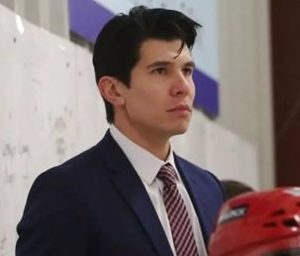
UMass Boston has announced the appointment of Beacons alum David Lun as the next head coach of the women’s hockey team.
Lun returns to the harbor campus after serving as the head coach of the women’s hockey team at Salve Regina since Aug. 2020. Under his leadership, the Seahawks posted their first winning season since 2014–15.
“We are thrilled to welcome David back to Beaconville,” said UMass Boston vice chancellor and director of athletics and recreation Dr. Jacqueline Schuman in a news release. “As both an alumnus and former student-athlete, he brings a deep understanding of our values and a clear vision for the future of our women’s hockey program. His track record of success, deep care and intentionality towards the development of student-athletes, team culture and community through sports, and drive towards championship level competitive excellence make him a tremendous addition to our department.”
“It’s an incredible honor to return to UMass Boston and lead this program,” Lun added. “This institution shaped me as a student and an athlete, and I’m excited to give back by helping these young women grow both on and off the ice. I look forward to building something special with this team.”
In his final season at Salve Regina, Lun guided the team to a 17–10–0 overall record and an impressive 14–4–0 mark in NEHC play, advancing to the conference semifinals. The team made major strides at both ends of the ice, improving its scoring average from 1.9 to 2.19 goals per game while reducing its goals-against average from 3.1 to just 1.6 during the 2024–25 season. For his efforts, Lun was named the NEHC coach of the year.
Prior to his time at Salve Regina, Lun spent three seasons as an assistant coach at Wesleyan, where he helped lead the Cardinals to their first-ever NESCAC tournament championship and NCAA tournament appearance in 2019–20.
In 2016, Lun served as the head coach and general manager of the FHL’s Danbury Titans. In that role, he oversaw prospect recruitment, roster management, trades, contract negotiations, and immigration filings for international players. Under his leadership, the Titans posted a 26-22-7-1 record, a plus-24 goal differential, and qualified for postseason play.
A native of Grand Rapids, Mich., Lun graduated from UMass Boston in May 2011 with a bachelor of science in exercise science. A four-year standout forward for the Beacons under current head coach Peter Belisle, Lun was known for his leadership and consistent production.
Following graduation, he played professionally in the FHL. In 2011–12, he posted 14 goals and 28 assists (42 points) with the Cape Cod Bluefins. He followed that up with a 10-26-36 season for the Danville Dashers in 2012–13 before serving as a two-time captain for the Danbury Whalers from 2013 to 2015. During the 2013–14 season, he notched 41 points.
Lun also holds a master’s degree in liberal studies with a concentration in social sciences from Wesleyan.
He will officially begin his role at UMass Boston on Aug. 25.
College Sports
Jonathan Klinsmann interview
Jonathan Klinsmann’s father was thrilled when his son chose to become a goalkeeper. Until age 10, Jonathan played youth football as an attacking midfielder, but one day donned the gloves for fun and never looked back. What his famous dad Jurgen realised then, and his son has come to appreciate since, was that while his […]


Jonathan Klinsmann’s father was thrilled when his son chose to become a goalkeeper.
Until age 10, Jonathan played youth football as an attacking midfielder, but one day donned the gloves for fun and never looked back.
What his famous dad Jurgen realised then, and his son has come to appreciate since, was that while his surname was always going to loom large over his career, choosing to play in a position when you stop goals, not score them, meant one less strand of comparison.
Advertisement
Fast forward 18 years and Klinsmann Jr has long stepped out of his patriarch’s shadow. He has forged his own career, including in territories where his dad had flourished, namely Germany, where Jurgen starred for Stuttgart and Bayern Munich, and now Italy, where his father became a hero at Inter and won the 1990 World Cup with West Germany.
It was at Bayern, where he was in the academy in 2008-09 while his father managed the club, that he fully committed to goalkeeping.
“My dad was really happy about that,” he recalls. “It was like, you know, ‘You’re going to become a professional at this age and he (Jurgen) had already had this many goals and appearances at that age and so on.’
“That could have been pretty difficult. At the end of the day, there’s still going to be comparisons, but it was fun when I went in goal. My first goalkeeper coach at Bayern made it so fun and that was the biggest thing at that age. I fell in love with the position. It all kind of stems from your experience as a kid.”
Now Klinsmann is back having fun after helping Cesena thrive in Serie B last term. They reached the playoffs in Italy’s second tier but missed out on promotion to Serie A.
It is at Stadio Dino Manuzzi where he has found the starting role he has craved after previous seasons as a reserve for the LA Galaxy and Hertha Berlin.
Jonathan Klinsmann was born in Munich, the son of Jurgen and his American wife Debbie Chin, and spent his formative years in California. He moved back to Bavaria with his family, and then back again to the U.S., where he became part of U.S. Soccer’s development program before earning a college soccer scholarship at University of California, Berkeley.
In 2017, following a trial period, he signed as a professional with then Bundesliga outfit Hertha Berlin. Klinsmann was 20, playing for his country at age-group level, and appeared ready to make his mark.
He had been named as the best goalkeeper at the 2017 Concacaf Under-20 Championship in Costa Rica earlier that year, helping the USA claim its first U20 regional title. Then, in December, he saved a penalty for Hertha in a Europa League tie with Ostersund.

Klinsmann saves a penalty against Ostersund in 2017 (Tobias Schwarz/AFP via Getty Images)
But manager Pal Dardai preferred the experience of Thomas Kraft and Rune Jarstein in league games, meaning Klinsmann often did not make the matchday squad.
He joined Swiss side FC Gallen but again found first-team minutes rare, so in August 2020 he accepted an offer from LA Galaxy. But while more opportunities arrived in MLS, there was still no permanent first-choice role. To compound matters, he was also sent home from the U.S. Olympic squad during qualifiers for the delayed Tokyo Games with a concussion suffered in training. The team subsequently failed to qualify.
Advertisement
“The Olympics had always been a dream of mine,” he says. “So I was pretty crushed about that. You have no control over it, you’re sitting on a couch at home watching the game hoping that the guys can can somehow get a goal and somehow get a result. Then the final whistle blows.
“So yeah, a hard time for me and for all the guys that were there. It was nice to see some of them go to the Olympics last summer, and if I’m honest it also made me a little jealous.”
Klinsmann missed three weeks of the Galaxy’s subsequent pre-season, hindering his attempts to impress, and a familiar pattern emerged. Not enough starts. Not enough minutes.
In 2024’s winter transfer window, he decided to risk moving again; this time to Serie B and another club where he was not guaranteed to be first-choice.
“It was a decision that took some time,” he says. “The biggest thing for me was to play. I need games, consistently and I had some options in the MLS, but it would have been kind of a No. 2, maybe fight for No. 1 situation.”
He arrived in Italy playing catch-up with fitness, doing his own mini pre-season that February, and once again it appeared an older player, veteran Matteo Pisseri, was in his way as Cesena charged towards promotion.
“I think that was probably the toughest couple months of my career so far,” he says. “The team was going well, so it was a case of ‘Why change?’ I was thinking, ‘Did I make the wrong decision here?’”
Last October everything changed. Manager Michele Mignani handed him a start against Salernitana.
“I had a goal kick over their (Salernitana’s) back line. Our forward ran onto it and their keeper got a red card for coming out, so it was a good moment,” he says. “We drew and it gave me loads of confidence. Then it was playing every weekend.”
Klinsmann only missed one of the remaining 28 games, a hand injury keeping him out. He kept seven clean sheets, and saved three of four penalties he faced. Serie A sides took note with their interest remaining this summer, but Klinsmann feels Cesena are well placed for another promotion push.
He is one of the ever-growing contingent of Americans in Italy. Christian Pulisic, Weston McKennie, Yunus Musah and Tim Weah currently play in Serie A, with Venezia’s Gianluca Busio and Andrija Novakovich and Kristoffer Lund at Palermo in Serie B.

Klinsmann in action for the USA Under-20 team in 2017 (Ezequiel Becerra/AFP via Getty Images)
In Cesena, Klinsmann is relishing the passion of the locals who approach him while he is out grocery shopping. It is different from the anonymity of L.A. but he enjoys it.
“I’m probably the only 6ft 5in American guy in the city, so I do stand out a little bit,” he smiles. “People are pretty respectful. Lately they’ve been asking me to stay here.”
Advertisement
After too long on the fringes, he feels settled and that bit removed from the pressure-narrative of being Jurgen Klinsmann’s son. But how has he reconciled that during his career so far?
“There’s definitely pressure,” he says. “It’s just the feeling of needing to prove yourself. I want to be able to show that I’m here for a reason. Knowing that people will always have something to say, I need to be good.”
It was in his teenage years that Klinsmann learned another big lesson about the spotlight. Aged 16, he responded to his father’s controversial decision to cut USMNT star Landon Donovan from the squad for the 2014 World Cup with a tweet that mocked the forward.
It went viral, and although Jonathan quickly apologized and deleted it, the incident led to Jurgen being grilled at press conferences amid rumours of acrimony between him and the USMNT’s joint all-time leading goalscorer.
“It was definitely a wake-up call,” he recalls. “I hadn’t experienced attention like that, even with who my father is. It was a lot of lessons rolled into one over a very, very short amount of time. I was a kid and I was in a very different state for the next year of just trying to figure out different things.
“It gave me perspective on a lot of things that in the moment I didn’t see or really appreciate, things about myself, about other people, about the job I wanted to do. It forced me to change some things: just attitude, perspective, obviously the way you approach social media. That was my media training for the rest of my life, right? A one-minute lesson on what not to do.
“And experiencing that in high school, where I can say I was young and stupid, is better than experiencing it when you’re 30. Your mental resilience definitely gets bumped but in the long run it was a positive. It gave me tunnel vision. I had no leeway.”

Jurgen Klinsmann was thrilled at his son’s decision to be a goalkeeper (Angela Weiss/AFP via Getty Images)
On and off the field, Klinsmann has certainly felt the downside of professional football. He says he has crossed paths with Donovan since — “It was good to see him, there was nothing (bad) there” — and even played for the Galaxy, who have immortalized Donovan with a statue outside their stadium.
And after his revival in Italy, he is hoping to play his way into Mauricio Pochettino’s plans before the home-soil World Cup. The goalkeeper’s position is in flux with NYCFC’s Matt Freese supplanting veteran Matt Turner during this summer’s Gold Cup and Turner’s club situation in limbo (but seemingly nearing resolution). Klinsmann says a spot in the squad is “definitely a goal.”
Advertisement
Klinsmann can even see parallels between Pochettino and his father, who led the U.S. to the last 16 of the 2014 World Cup and semifinals of 2016 Copa América before being fired later in 2016 at the start of the futile effort to qualify for the 2018 World Cup.
“It’s great to have a coach like him,” he says of Pochettino. “There are a lot of similarities from when my father was there. It feels similar from the outside looking in.
“Having someone that knows how to deal with all of those characters and guys who play in Europe. Then there are Spanish-speaking guys, and of course he (Pochettino) speaks Spanish. It’s a cool kind of melting pot of a national team, which in turn reflects the United States, right? I would love to be part of it.”
A penalty-saving expert with a point to prove and momentum finally behind him: He may be a late bloomer, but Klinsmann might be flourishing at just the right time.
(Top photo: Image Photo Agency/Getty Images)
-
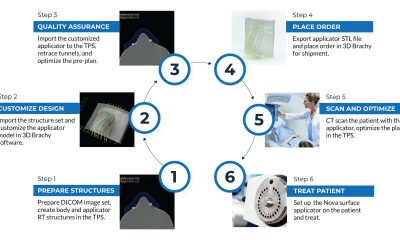
 Sports2 weeks ago
Sports2 weeks agoAdapti, Inc. (OTC
-
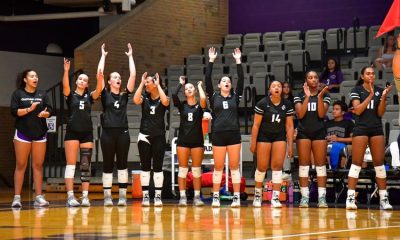
 Sports3 weeks ago
Sports3 weeks agoVolleyball Releases 2025 Schedule – Niagara University Athletics
-

 High School Sports1 week ago
High School Sports1 week ago100 days to men's college basketball
-
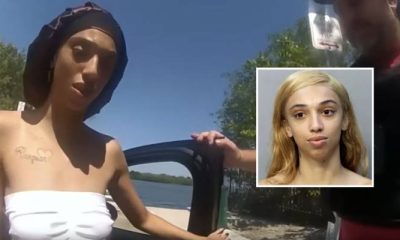
 Rec Sports2 weeks ago
Rec Sports2 weeks agoFlorida woman, 20, accused of pepper-spraying rich men in Miami Beach hotels, stealing their luxury watches
-

 Health2 weeks ago
Health2 weeks agoJoliet West alum's basketball clinic focuses on mental health as well as physical performance
-

 Youtube3 weeks ago
Youtube3 weeks agoShe will remember this forever 💪🙌
-
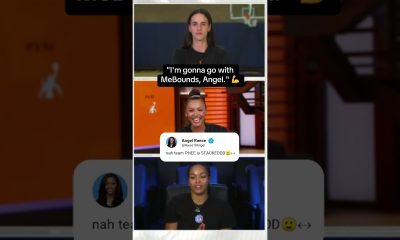
 Youtube3 weeks ago
Youtube3 weeks agoAngel Reese on Team Collier 👀
-

 Youtube3 weeks ago
Youtube3 weeks agoDouble play but make it The Show 🔥
-
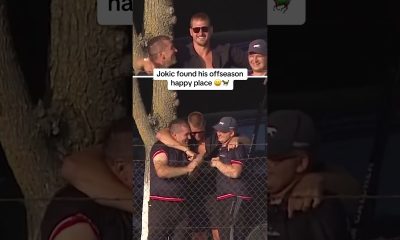
 Youtube3 weeks ago
Youtube3 weeks agoNikola Jokic was hyped after his horse won a race 🏆
(via @arenasporttv/TT)
-

 Youtube3 weeks ago
Youtube3 weeks agoMichael Conforto hit the perfect blue on the meter with this throw to home 😮






























